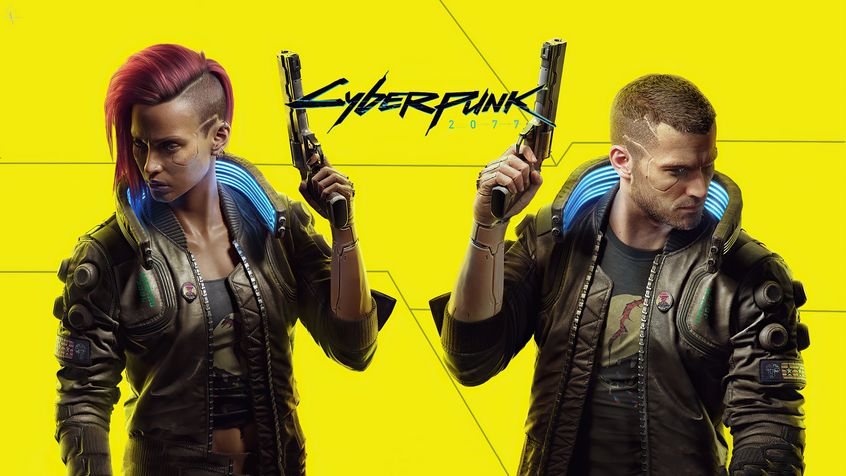Cyberpunk 2077
I’ve been thinking a lot about dystopias . It feels sort of inevitable that I would. It is, after all, 2024, and the world feels very much like it’s lurching inevitably towards a doom everyone sees coming, but no one wants to prevent. Mine may well be the last generation to know a world that is amenable to our species, or at least the last to have some semblance of peace. The end of the world feels very nigh, and it’s not only the werewolf corpos behind it.
In my Beneath a Steel Sky review , I talked about that game’s view of dystopia, and how it felt like a naive relic. In that game, dystopia was something that was able to be escaped and be reformed into a more equitable society. In that game, Foster, through the power of friendship and compassion, is able to find a way to turn a dystopia into a utopia. The mechanics that created the dystopia in the first place are ones that can be undone and overwritten. All it takes is one person willing to stand up to power, and the system can be altered for everyone.
This is a view of dystopias that stems directly from the 90s and the time immediately after the end of the Cold War. The 90s were a decade of optimism, with the fall of communist dictatorships, the end of Apartheid, and the sensation of a new dawn just over the horizon for human rights, democracy, and capitalism. The internet would bring us all together. We could move into the 21st century as one species, united towards our common prosperity. In this context, the fiction of dystopias became an optimistic one. No dystopia was permanent. The engines of horror could be demolished and replaced with optimism. The only thing left to fear was that which lay beyond our control - natural disasters, aliens, Godzilla. We were the arbiters of our destiny, and that destiny was golden.
I live in 2024. The only thing to fear in 2024 is that I might actually have to live through the next decades.
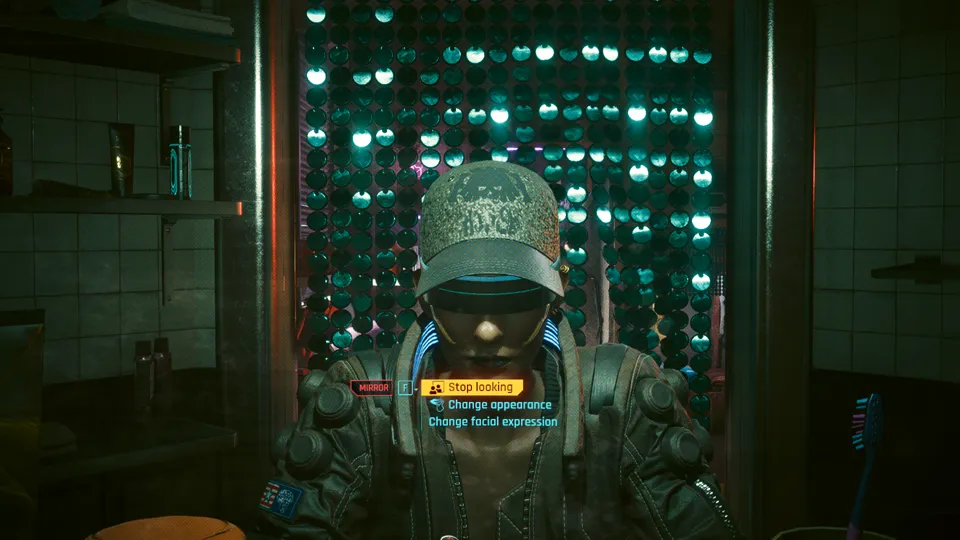 V is a fashion icon.
V is a fashion icon.
Cyberpunk 2077 came out in 2020, with much of the development having finished prior to some of the more drastic events of that year. It depicts a world that careened straight into an anarcho-capitalist dystopia dominated by mega-corporations. While there were those - like Johnny Silverhand, one of the game’s main pro/antagonists - who fought back against this transition, their efforts were in vain. The world became an anarcho-capitalist dystopia regardless. By the time players meet the protagonist, V, there is no longer a question of overthrowing the status quo and implementing a better system. Indeed, one of the main sources of tension V faces is having to push back against Silverhand’s insistence that the overthrow of the system is the only way forward. Instead, this is a system in which the best people can hope for is to survive, and perhaps, just maybe, to thrive.
This is a very different dystopia from Beneath a Steel Sky, and a very different vision of the role any one person can play in shaping the course of that dystopia. There is no escape from the dystopia in Cyberpunk 2077, nor is there any expectation or desire that there ought to be. Cyberpunk 2077’s dystopia is, in many ways, a much more familiar one than Beneath a Steel Sky’s. It’s a dystopia that reflects what it feels like to be in 2020, and, even moreso, what it feels like to be in 2024.
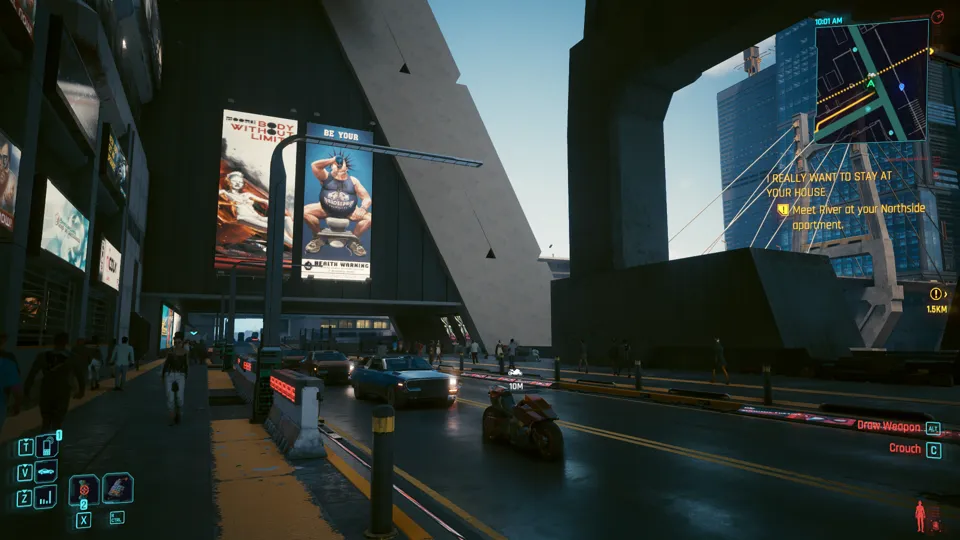 My favourite activity in this game is causing traffic jams, and I will not apologise for it.
My favourite activity in this game is causing traffic jams, and I will not apologise for it.
There is a horror buried within Cyberpunk 2077, and it goes beyond the body horror and existential horror that the game presents as its driving conflict. The horror of Cyberpunk 2077 lies in recognising how broken Night City is, but also, how absolutely familiar it is.
Up until recently, I travelled to Los Angeles fairly often. Los Angeles is a very distinct, being in equal parts beautiful and magical, yet absolutely horrifying. It is a city of dreams, both where they’re brought to life, and where they’re brought to die. It is a city paralysed by its own lack of transportation infrastructure, yet too enamoured with the ideal of the car to take anything but cursory steps to address it. It is a city of the ultra wealthy brushing elbows with the ultra impoverished, and learning how to ignore it. Tents spring up on the sidewalks in front of buildings bought with gold, and the discussion is how to brush those tents away. The absurd wealth of Los Angeles creates an increasingly unequal environment, with the rich growing ever richer through the absolute exploitation of the poor.
Los Angeles is the cyberpunk dystopia writ large. There may not be massive guns on every corner, but really, that’s just a cosmetic change. The systems and mechanisms are all there, already in place, locking in and sealing the destinies of all those trapped inside. It is a hyper-microcosm of the greater trend of capitalism, but it is a cautionary tale nonetheless.
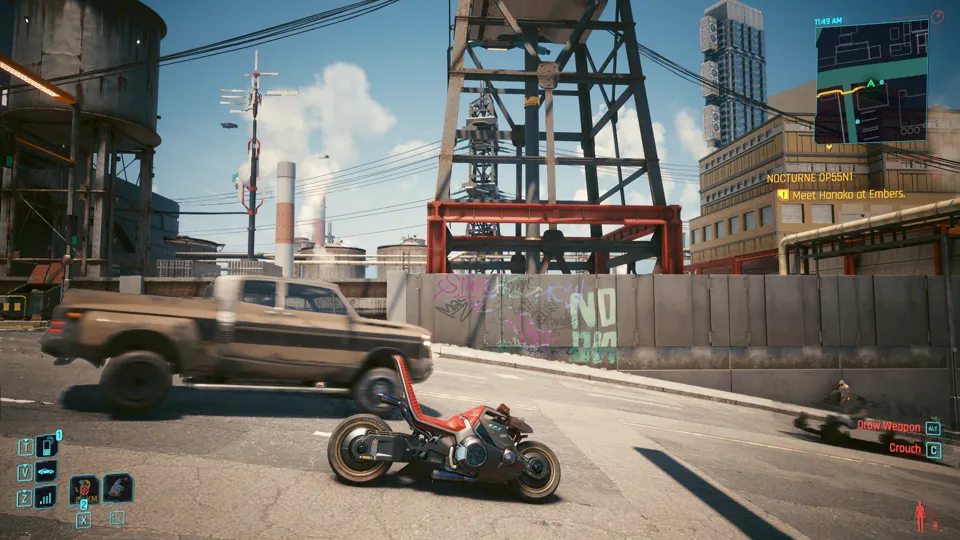 The motorcycle rules the road.
The motorcycle rules the road.
Night City is Los Angeles with the serial numbers half-heartedly rubbed off. In cruising through the traffic-clogged streets - because Night City is just as car-centric as the actual Los Angeles, which amuses me to no end - I got the same sort of sensations that I do when I cruise through Los Angeles. Everything is advanced fifty years in a particular vision of the future that may or may not reflect the actual course of humanity’s future, but it is a recognisable and real place, and the dystopia it presents is a real and honest one.
In some ways, this recognition of the reality of the dystopia makes the horror worse. The story of V is the story of a loss of autonomy, and of having one’s future ripped away by forces well beyond V’s understanding or control. There is no reclamation of that lost future. All that’s really left in the wake of that horror is the decision of what to do with the time that’s left. Again, this is a perfect parallel of our own world, and the reality that our lives are not and never were our own. We exist within the corridors created for us, and while we may believe we chart the course of those paths, the reality is that all we really control is the decorations on the walls as they close in upon us. We seek meaning in the mundane, because we know we will never be anything more.
This is not Beneath a Steel Sky. Our voices don’t change the course of the world. The course is set, and all we can do is decide how to survive.
 I shall spend my time in virtual realities, thank you.
I shall spend my time in virtual realities, thank you.
Cyberpunk 2077 offers a fair amount of agency to V as she struggles against an inevitable outcome. There are many choices that feel meaningful, and which shape certain aspects of the world around her. V makes an honest difference in the lives of those who care about her, and the game does an excellent job getting the player engrossed in those stories and feeling as though they are a fundamental part of Night City.
As I played, though, I never lost the sensation of Los Angeles, and the reality that, for all the difference V makes for those around her, she cannot change the world. Their individual paths may meander, but within the pre-determined box. I think of Johnny Silverhand as both a pro and antagonist because he refuses to accept that truth, that the system cannot be destroyed, and the world cannot be changed. For V, survival within the dystopia means accepting the inevitability of the dystopia. The true conflict of Cyberpunk 2077 is not between V and the dystopia, but between V and acceptance. Johnny is the catalyst to rethink whether the dystopia should be accepted, but also the certainty that the only alternative is oblivion.
So here I sit in 2024. I look out my window at a world that teeters on the edge of oblivion. I stress, and I do my part to stave off the end. I don’t use plastic, don’t buy new materials, eat vegan, and use public transit, but I know that nothing I do will ever be enough. The world I grew up in is gone, and the world that awaits the next generation is hostile, toxic, and short. I can accept the dystopia, or I can struggle, but there is no escape but oblivion.
This is what Cyberpunk 2077 is about. It turns the lens of dystopia back on us and asks us what we will accept.
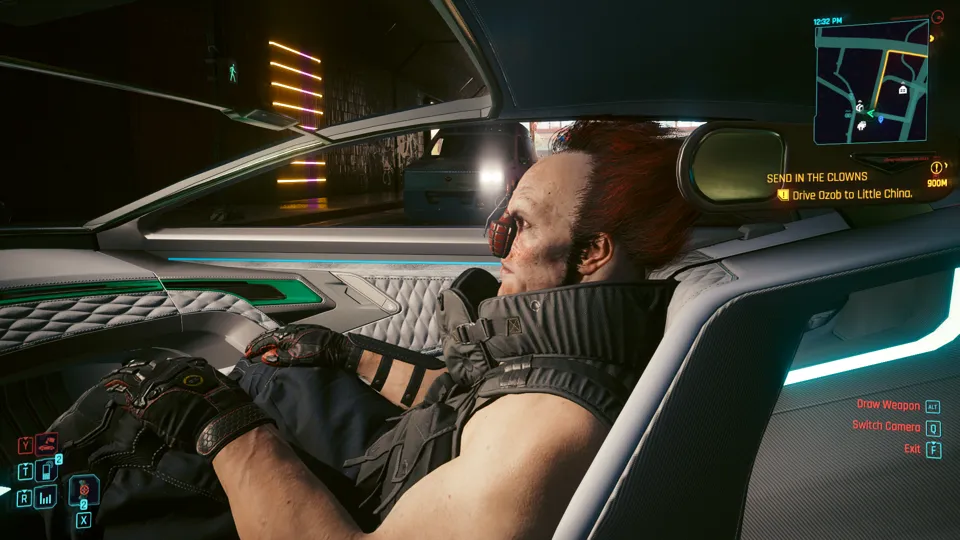 I do not accept this man in my batmobile.
I do not accept this man in my batmobile.
What Cyberpunk 2077 offers, though, and why I’ve sunk over seventy hours into it, is the opportunity to understand the impact we have. Even if we can’t change the world or break the system, the small impacts our lives have on those around us are not meaningless. I became invested in the small dramas around me, of rescuing hostages and befriending misfits. I enjoyed exploring the world and being party to a myriad of small stories. I learned to excel in non-lethal combat so I could try not to cause any more harm than had already been done, and it made me feel like I was doing good. When I reached the ending and got bombarded by messages from people I’d helped, it felt meaningful. It felt like a commentary on my own existence, that perhaps at the end, even if I can’t break the system, I can at least change the decorations on others’ walls.
Cyberpunk 2077 is a vision of dystopia for a pre-2020 world. It is beautiful and horrifying, but its true horror comes from the recognition that Night City is not some fantasy place. It is here. It is now. It is inevitable. All we can do now is decide how to make it our own.
Developer: Cd Projekt Red
Genre: Roleplaying Game
Year: 2020
Country: Poland
Language: English
Play Time: 60-70 Hours
Youtube: https://youtu.be/iNCzjIwVMGg
